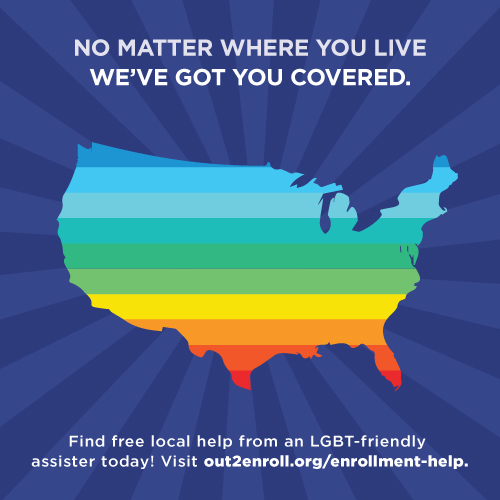With the deadline to get insurance starting January 1 coming up on December 15 the time to act is now.
 Before the Affordable Care Act (ACA), LGBT people faced significant discrimination in access to healthcare. That all changed with the passage of the law fondly known as Obamacare, and the uninsured rate for LGBT people has reached an all-time low.
Before the Affordable Care Act (ACA), LGBT people faced significant discrimination in access to healthcare. That all changed with the passage of the law fondly known as Obamacare, and the uninsured rate for LGBT people has reached an all-time low.
But there are still far too many uninsured people in the LGBT community — which is why the White House, the U.S. Department of Health and Human Services (HHS) and partners like Out2Enroll and Enroll America have designated the week of December 7-11 a LGBT Week of Action.
“One of the reasons for calling it a Week of Action is to get people to feel empowered to look at their coverage options, see what works for them, and be part of this historic change,” says Kellan Baker, a senior fellow at the Center for American Progress (CAP) and a steering committee member for Out2Enroll. He says many in the LGBT community remain skeptical about the ACA, although there’s good reason not to.
Some folks wonder if the law is really for us, when in fact there are two huge policy developments this year that directly impact LGBT people when it comes to insurance access.
The first is the U.S. Supreme Court decision legalizing same-sex marriage. Married people are now treated the same way in the insurance marketplace whether they’re gay or straight.
What’s more, the Centers for Medicare & Medicaid Services (CMS) issued new guidance on December 1 that requires state Medicaid programs to recognize same-sex marriages — yet another way LGBT people are now treated equally.
The second major policy shift involves additional steps to strengthen Section 1557 of the ACA, which includes non-discrimination protections for LGBT people. Although Section 1557 has been the law since the ACA was passed in 2010, the non-discrimination protections aren’t always enforced in either the provision of health insurance or healthcare services.
That’s why the HHS Office for Civil Rights has implemented a process that makes it easy for LGBT people to report discrimination. Out2Enroll provided training to all regional HHS offices so they’re prepared to process these complaints appropriately.
According to José Plaza, national director of Latino Engagement for Enroll America, who handles the LGBT portfolio, efforts to enforce Section 1557 are vitally important.
It will be a great win for the community in terms of education and reporting up issues about the care they seek. It puts the onus on community centers and doctors to be better informed. If someone is transitioning, we’ve seen issues where paperwork might show them as male so if they’re trying to get a woman’s service they’ll be denied. There are provisions being made to assist them.
Denial of service to transgender people is one of the most common types of discrimination faced by the LGBT community, and Out2Enroll provides detailed information so trans people — and everyone in the LGBT community — can make sure they’re getting the coverage they’re entitled to.
Or consider the Michigan couple who were turned away by their baby’s pediatrician because the doctor didn’t approve of the fact they were lesbians. That’s discrimination, too.
According to Baker, that’s one of the stories Out2Enroll shares with regulators to demonstrate why enforcing Section 1557 is so important.
People ask, ‘Now that marriage equality happened, isn’t that all over?’ And no, it’s not over. So many transgender people and gay people are just accustomed to hiding, and feeling like they’re going to be discriminated against, that they wonder why they should expose themselves to that. That’s why we’re working with enrollment assisters and civil rights regulators to make sure people know there are protections now that weren’t there before.
The HHS Office for Civil Rights is already investigating and resolving cases of discrimination, and reporting discrimination could not be easier. Just visit the HHS OCR website and file a complaint.
“Don’t just tell your friends,” Baker adds. “Tell someone who can do something about it. The site will walk you through it and the staff is prepared to help.”
 To help reach younger people who make up a large proportion of the uninsured in the LGBT community, there will be a variety of online events during the Week of Action, Plaza says. You can find details at the Out2Enroll website.
To help reach younger people who make up a large proportion of the uninsured in the LGBT community, there will be a variety of online events during the Week of Action, Plaza says. You can find details at the Out2Enroll website.
Remember: The deadline to sign up for coverage that kicks in on January 1, 2016, is December 15th. Open enrollment for 2016 continues through January 31, 2016. About 80 percent of people who enroll will qualify for financial assistance to pay for coverage. And with the penalty for not having insurance in 2016 going up to $695 or 2.5 percent of your annual income, whichever is greater, it may be less expensive to sign up for insurance than to pay the penalty.
You can enroll at Healthcare.gov. If you want in-person assistance, Out2Enroll has an online tool to help you find a local expert who has been trained in LGBT-specific issues. Just look for the rainbow icon. And if you want to compare plans, the Get Covered America Plan Explorer tool from Enroll America is very handy.
“Get covered, be part of history and avoid paying the fine for not having insurance,” Baker says. “And make your coverage and healthcare work for you. If you’re not getting what you need, assert your rights.”
[Images courtesy of Out2Enroll.]



